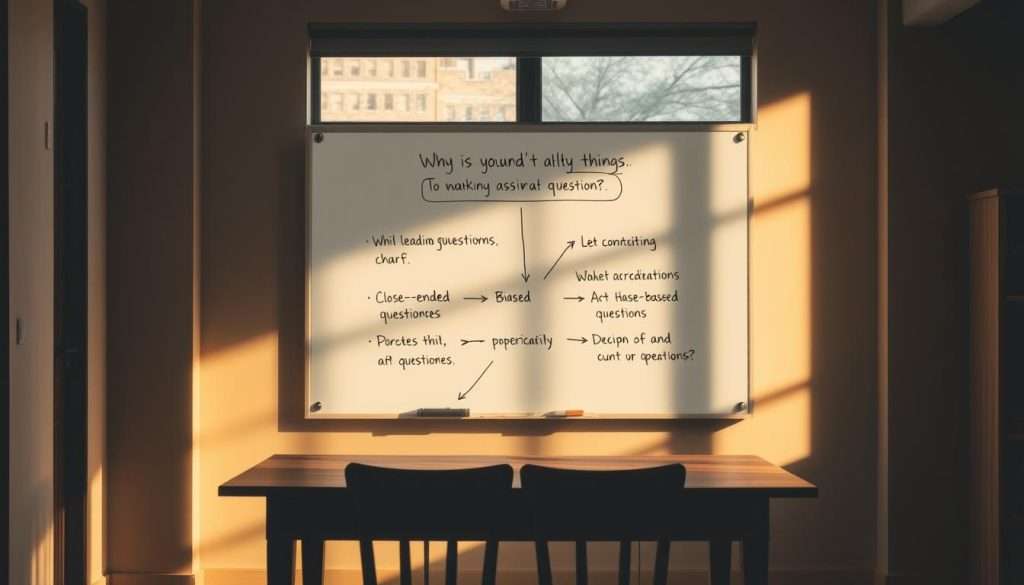Have you ever felt like you’re being grilled instead of having a real talk? We’ve all been there. Learning the art of asking good questions is key to better communication.
My older son and I love geeking out about how people interact. We’ve learned that being curious is what makes conversations rich and meaningful. Asking the right questions can lead to fascinating talks and a deeper understanding of our world.
So, how do we get better at effective questioning techniques? It begins with really caring about what the other person has to say. By doing this, we make a space where everyone feels safe and engaged to share their thoughts.
Key Takeaways
- Curiosity is key to meaningful conversations.
- Asking good questions can lead to deeper connections.
- Effective questioning techniques involve being genuinely interested in others.
- Listening is just as important as asking questions.
- Creating a safe environment is crucial for open dialogue.
The Power of Questioning in Communication
Questions can change how we talk to each other, making our conversations deeper and more meaningful. By using good questioning techniques, we can get better at talking and connect more with others.
Why Questions Matter in Daily Interactions
Questions are key to good communication. They help us clear up things, explore new ideas, and show we care about what others think. Asking questions shows we value their opinions, leading to more honest and open talks.
Some key benefits of questioning in daily interactions include:
- Clarifying information and avoiding misunderstandings
- Showing genuine interest in others and their experiences
- Encouraging the sharing of ideas and perspectives
How Questions Shape Conversations and Relationships
The way we ask questions can really change our talks. Using effective questioning techniques can lead our conversations to more interesting and meaningful topics. This can make our relationships stronger.
Building Deeper Connections Through Inquiry
Asking the right questions can help us connect with others on a deeper level. It shows we’re willing to listen and understand their views. This creates a safe space for them to share their thoughts and feelings.
To build deeper connections through inquiry, ask open-ended questions. These questions let the other person share more about themselves. This can make our conversations more meaningful and help us get better at talking, strengthening our relationships.
Understanding The Art of Asking Good Questions
Good questions can spark thought, start discussions, and lead to deep insights. They are key in our social and work lives. We’ll look at what makes a question good and how it can improve our talks.
Defining What Makes a Question “Good”
A good question is clear, short, and fits the situation. It should invite a detailed answer, not just a simple “yes” or “no.” Effective questions make us curious and help us understand more. For example, “What did you think of the movie and why?” is better than “Did you like the movie?”
The Difference Between Effective and Ineffective Questions
Good questions lead to real talks. Bad ones are vague, leading, or too hard, causing confusion or shallow answers. Good questions are made to start deep conversations.
Real-World Examples of Question Transformation
Here are some examples of making bad questions into good ones:
| Ineffective Question | Effective Question |
|---|---|
| Did you have a good day? | What was the highlight of your day and why? |
| Do you like this restaurant? | What do you think of this restaurant, and what would you recommend? |
As shown, good questions get better answers. Learning to ask good questions can make our communication better and our relationships stronger.
“The important thing is not to stop questioning. Curiosity has its own reason for existence.”
The Psychology Behind Effective Questioning
Questions are more than just a way to get information. They shape our thoughts and create a safe space for talking. Asking questions can change the way we talk and connect with each other.
How Questions Affect the Brain and Thought Processes
Studies show that questions can really change how we think. The right questions can make us think more deeply, be more creative, and remember things better. For example, open-ended questions help us explore more ideas and solve problems better.
Creating Psychological Safety Through Thoughtful Inquiry
Asking thoughtful questions can make people feel safe to share their thoughts. This is key in places where talking openly is important, like schools or when solving conflicts. Questions that show we care and understand can build trust and help us work together better.
The Connection Between Questions and Critical Thinking Skills
Good questioning is all about critical thinking. The right questions help us analyze information, spot biases, and make smarter choices. This skill is super important in our daily lives, helping us deal with tough situations more clearly and confidently.
| Question Type | Effect on Thought Process | Outcome |
|---|---|---|
| Open-ended | Stimulates critical thinking and creativity | Enhanced problem-solving skills |
| Reflective | Encourages self-analysis and introspection | Better understanding of oneself and others |
| Probing | Deepens understanding and clarifies information | More accurate and detailed insights |
Understanding the psychology of good questioning helps us use questions to improve communication skills and enhance critical thinking skills. Whether at home or at work, knowing how to ask questions is key to understanding each other better and building strong connections.
Types of Questions and When to Use Them
Effective communication depends a lot on the questions we ask. Knowing the right questions can make our talks more meaningful. It helps us understand each other better and build stronger bonds.
Open-Ended vs. Closed Questions
Open-ended questions help us explore deeper into a topic. They ask for more than just a yes or no. Using open-ended questions makes our conversations more interesting and informative.
For example, instead of asking “Do you like this idea?”, try “What do you think about this idea?” It invites a more detailed answer.

Probing Questions for Deeper Understanding
Probing questions help us understand a topic better. They ask for more details or clarification. Asking “Can you elaborate on that?” or “How did you come to that conclusion?” can give us a deeper insight.
Reflective Questions to Encourage Self-Analysis
Reflective questions make us think about our own thoughts and feelings. They help us grow personally. Asking “What did you learn from this experience?” or “How did that make you feel?” can reveal a lot.
Hypothetical Questions to Explore Possibilities
Hypothetical questions let us imagine different scenarios. They’re great for brainstorming or planning for the future. Asking “What would you do if you had unlimited resources?” can spark new ideas.
Learning about and using these question types can greatly improve our communication. It makes us more effective in both our personal and professional lives.
Mastering the Technique of Asking Open-Ended Questions
Learning to ask open-ended questions can change how you talk to others. It leads to deeper talks, more meaningful answers, and a clearer view of those you meet.
How to Formulate Questions That Invite Elaboration
To craft good open-ended questions, you must be curious and really care about what the other person thinks and feels. Avoid simple yes/no questions. Instead, ask questions that make people want to share their stories. For example, instead of “Did you like the event?”, ask “What did you think of the event?” or “Can you tell me more about your experience?”
Examples of Transforming Closed Questions into Open Ones
Here are some examples of changing closed questions into open ones:
- Closed: “Are you happy with your job?”
- Open: “What do you enjoy most about your job?”
- Closed: “Is the training helpful?”
- Open: “How has the training impacted your work?”
The “What, How, Why” Framework for Question Development
The “what, how, why” framework is great for making strong open-ended questions. For example:
- What: “What were your thoughts on the recent project?”
- How: “How did you feel about the team’s dynamics?”
- Why: “Why do you think the project turned out the way it did?”
By using these methods, you’ll get better at mastering the technique of asking open-ended questions. This will make your conversations more interesting and useful.
The Role of Timing and Context in Question Formulation Techniques
Asking questions is more than just the right words. It’s about timing and context too. Executives spend a lot of time asking for information. This shows how important it is to know when and how to ask well.
When to Ask vs. When to Listen
It’s important to know when to ask and when to listen. Asking too many questions can seem like an interrogation. Not asking enough can mean missing out on important insights. Getting the balance right is crucial. It’s about feeling the conversation’s rhythm and the other person’s signals.
Adapting Questions to Different Situations and Audiences
The context of our questions affects how they’re received. In formal meetings, questions are often more structured. In casual talks, they can be more open. Changing our questioning style for the situation and audience is key for good communication.
| Situation | Questioning Style | Outcome |
|---|---|---|
| Formal Meeting | Structured, Direct | Clear, Concise Information |
| Casual Conversation | Open-Ended, Exploratory | Deeper Understanding, Rapport Building |
Reading Body Language to Guide Your Questioning Approach
Understanding someone’s body language can guide your questions. If they seem uncomfortable or defensive, adjust your approach. Experts say, “reading non-verbal cues can greatly improve our questioning.”
“The way we ask questions can either create a safe space for open dialogue or inadvertently put people on the defensive.”
By paying attention to timing, context, and body language, we can enhance our questioning skills. This leads to more effective and meaningful conversations.
Building Rapport Through Strategic Questioning
Questions are key to building relationships. They help us create strong connections. Asking the right questions is essential for good communication in all areas of life.
Using Questions to Establish Trust and Credibility
Asking questions shows we care about others, building trust. Open-ended questions let people share more, making us understand each other better. This makes everyone feel important.
Creating Connection Through Genuine Curiosity
Being truly curious is important in asking questions. It makes our conversations deeper than just small talk. Being present and showing we care is crucial.
Cultural Considerations in Question Formulation
Cultural differences affect how we see questions. Knowing this helps us ask questions that fit our audience. This way, we can communicate well in different cultures.
Common Pitfalls to Avoid When Asking Questions
Asking questions is an art that needs finesse and awareness of common mistakes. When we ask questions, we’re not just looking for info. We’re also building relationships and understanding. But, some common mistakes can hurt our ability to communicate well.
Leading Questions and Unconscious Bias
One big mistake is asking leading questions that show our biases. These questions can push the conversation in a certain way, affecting the answer. To improve communication skills, we must know our biases. We should ask neutral questions that let for real answers.
Overwhelming With Too Many Questions at Once
Another mistake is asking too many questions at once. This can cause information fatigue and make the talk feel like an interrogation. To avoid this, we should ask questions one at a time. This lets the other person think before answering.

Asking Without Genuine Interest in the Answer
Asking questions without really caring about the answer can seem fake or manipulative. When we ask questions, we should want to truly understand the other person’s view. This builds trust and leads to deeper talks.
Interrupting or Not Allowing Time for Responses
Lastly, interrupting or not letting others finish their thoughts is a big mistake. Interrupting cuts off important info and shows we’re not fully listening. By letting others finish, we show we value their thoughts and are committed to effective communication.
By watching out for these common mistakes and improving our question formulation techniques, we can ask better questions. This helps us communicate more effectively.
Powerful Questioning Techniques for Specific Scenarios
Effective questioning is a skill that works in many places, like work and personal life. By changing how we ask questions, we can talk better and get better results.
Professional Settings and Workplace Communication
In work, asking the right questions can make meetings and teamwork better.
Questions for Effective Meetings and Collaborations
- What are the main goals of this meeting?
- How can we make sure everyone’s ideas are heard?
- What might stop our project, and how can we fix it?
Personal Relationships and Conflict Resolution
In personal life, asking questions can solve problems and help us understand each other better.
Questions That Defuse Tension and Build Understanding
| Question Type | Example | Purpose |
|---|---|---|
| Reflective | “How did you feel about that?” | Encourages empathy |
| Clarifying | “Can you explain that further?” | Resolves misunderstandings |
Educational Contexts and Learning Environments
In schools, asking questions can make students think deeply and stay interested.
Questions That Stimulate Critical Thinking and Engagement
Questions like “What if…?” and “How does this relate to…?” help students think outside the box and connect ideas.
Practicing and Improving Your Questioning Skills
Learning to ask good questions can make your communication better and strengthen relationships. To get good at it, you need to practice and keep getting better.
Daily Exercises to Enhance Question Formulation
Doing daily exercises can help you get better at asking questions. Try making open-ended questions about different things, like news or your own life. For example, instead of saying, “Did you like the movie?” ask, “What did you think about the movie’s plot?” This change can make your conversations more interesting and deep.
Feedback Mechanisms for Self-Improvement
Getting feedback is key to getting better at asking questions. Ask people you know to check out your questioning style and give you tips. You can also record yourself talking and then look at it to see how you did. This way, you can find out what you need to work on.
Technology Tools and Resources for Better Question Development
There are many tech tools that can help you improve your questioning skills. Apps and websites offer tips, exercises, and quizzes to help you get better at asking questions. Using these tools can be a fun way to improve how you communicate.
| Tool | Description | Benefit |
|---|---|---|
| Questioning Apps | Apps that provide daily questioning exercises | Improves question formulation |
| Online Courses | Courses focused on communication skills | Enhances overall communication |
| Feedback Platforms | Platforms that allow users to receive feedback on their questioning style | Helps in identifying areas for improvement |
By making these practices a part of your daily life, you can really get better at asking questions. This will help you communicate more effectively.
Conclusion: Transforming Communication Through Better Questions
Mastering the art of asking good questions is key to effective communication. It involves understanding the psychology of questions, using different types, and knowing when and where to ask. This way, we can greatly enhance our communication skills.
Good questions help us get information, build rapport, and establish trust. They also help us connect deeper with others. By asking open-ended questions and reflecting on our thoughts, we become more empathetic and engaging.
To get better at communication, try out the techniques from this article. Use different questioning methods in your daily talks. Be patient with yourself as you learn. With practice, you’ll ask better questions, leading to more meaningful conversations.

